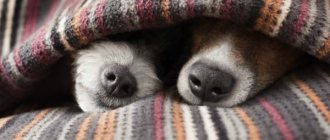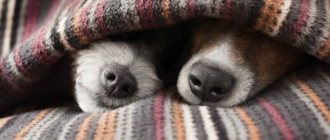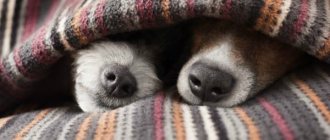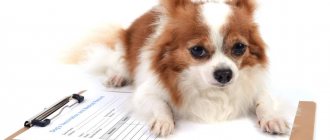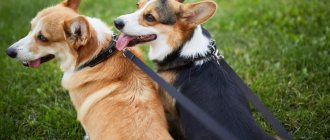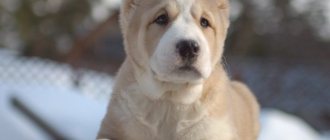Like people, the duration of wakefulness of four-legged pets primarily depends on age. Puppies and older animals spend the most time in the kingdom of Morpheus.
But there are other factors, including some that can pose serious health risks. For this reason, every responsible owner should know how many hours a day a dog needs to sleep and in what cases it is recommended to take it to the veterinarian.
Amount of sleep
Newborn puppies spend almost 90% of the total time of the day sleeping. Growing individuals can sleep from 15 to 18 hours, or more precisely ¾ of the day. As you mature, your sleep time will gradually decrease. The puppy may fall asleep suddenly, even while eating or playing. Unprepared owners may be surprised and even frightened by this feature of their pet, but experts assure that there is no need to worry. In the first year of life, the baby will most likely be hyperactive, he will be especially interested in scratching and chewing objects, he will run and jump a lot, and after that he will sleep soundly.
The more active a dog is, the more time it will spend sleeping. As the puppy grows up, he will sleep less, but not less than 50-65% per day. Babies up to 2-3 months sleep almost around the clock. They can fall asleep on the go, with their faces buried in a bowl. In addition to games and fun, puppies innately want to protect the territory, but if they are well-fed, they are immune to outside stimuli. In addition to sleeping, adult dogs can also doze.
Pedigree
Oddly enough, the breed of the dog also affects the duration of its sleep. This is due to the difference in size and weight of the animal. For example, small breeds such as Yorkies, lapdogs, Spitz, Chihuahuas, Shih Tzus, and dachshunds are active most of the time. They need only 12 hours to rest.
Large dogs, for example, shepherds, huskies, terriers, mastiffs, and St. Bernards, like to sleep longer - up to 16-18 hours a day.
Animals that are engaged in protection, herding livestock (for example, Siberian husky, collie) sleep for short periods of time and are ready to be active for a long period of time. Out of boredom and idleness, dogs can sleep for several hours without waking up.
Observing your pet, you will notice that companion breeds over time begin to imitate the daily routine of their owner. If he sleeps until lunch or goes to bed early in the evening, then the dog will not deny himself the pleasure of taking a nap after eating or going to bed with his owner.
Properly selected daily routine and nutrition, moderate physical activity and active games contribute to quality sleep. Good rest is the key to your pet's health. Keep track of how much your dog sleeps and how it behaves, and then you can promptly detect a problem or changes in health.
Why is sleep necessary?
A dog needs to sleep so that it grows up healthy. Every part of a puppy's body, from the brain to the tendons, grows very quickly. Sleep allows you to replenish energy and vitality in order to grow and develop properly. The pet constantly studies the multifaceted world around it, and also learns new things. Sleep is essential to maintaining a healthy waking state. Through quality rest, a dog can process and explore the countless experiences he experiences while he is awake.
We advise you to read: How long do dogs bear puppies?
Ignoring
After a couple of such sessions, the dog will begin to play at night. She will persistently draw you into the process, even if you are currently sleeping. In extreme cases, the baby will start walking around the rooms, sighing, fidgeting... It is unlikely that you will fall asleep. How to fight?
Option one - ignore. If you get up in the middle of the night, just go about your business. Pretend that there is no puppy nearby. You can't pet, talk, or even look. The baby may compulsively spin around and try to start a game. Do not pay attention. If your pet is in the way, gently move it away with your foot. Leaning down and touching with your hands may feel like encouragement.
Typically training takes from 2 to 5 days. Sooner or later, the baby will understand that there is no one to play with at night, so he will prefer to sleep.
Stages of sleep
The structure of the dream state in dogs and humans is somewhat similar. The only difference is the length of time spent in dreams. At each stage, the brain experiences stress, and certain processes occur in the body.
Sleep is divided into types:
- Napping – the pet is conscious, so it can control its surroundings. The dog's body is relaxed. While dozing, the pet rests partially. Drowsiness can progress to the stage of falling asleep if no one disturbs the dog.
- Shallow sleep—active cell restoration processes are launched in the body. In this state, the puppy is relaxed, but hears sounds and rustles.
- Deep stage of sleep - at this stage the animal’s muscles are completely relaxed. If you watch a puppy, he may move his lips and twitch his paws in his sleep.
- REM sleep – this type of dreaming has been studied and discovered only recently. The puppy may be completely relaxed and motionless, but the eyeballs may move. REM sleep is a continuation of deeper hibernation or a state before waking up.
Possible violations
Sleep disturbances or insomnia are rare in dogs. As a rule, pets sleep soundly at night and do not wake up without a good reason. But even they have problems sleeping. Insomnia can be caused by both psychological and physiological problems.
The dog may not sleep at night if it is stressed, worried, or in a tense emotional state. Also, problems with sleep are possible in dogs that have suffered from cruel treatment; the psyche of such pets is traumatized.
Sleep disorders in dogs
Physiological reasons cannot be ruled out. For example, itching from fleas or allergies, otitis media, arthritis, pinched nerves, and other diseases that cause pain. All this can cause sleep disturbances.
Healthy sleep is very important for all pets, including dogs. If sleep disturbance occurs or insomnia occurs, then this generally negatively affects the entire body, and immunity decreases. If the owner observes sleep disturbances in the pet, it is worth contacting a veterinary clinic for help.
Ideal place to sleep
Many owners are happy when they notice that their little pet is able to fall asleep anywhere and at different times of the day. However, in such an environment the sleep will not necessarily be quite comfortable and sound. It is important to provide comfort to the puppy so that he replenishes his vital energy and spends it on games and training. Understanding the environment is exciting and at the same time too tiring for a pet who has just begun to develop in this world. The puppy may not even feel tired.
A few recommendations for owners:
- It is important to provide your pet with a personal den where no one will disturb him. Ideally, a place to sleep should be comfortably furnished, it should have blankets, pillows, rugs that are easy to wash;
- For a dog, silence is important, where there is no music, people talking, laughter or other sounds. If there are children in the house, then it is worth teaching them not to disturb the pet during sleep;
- if an ideal place for a puppy’s den is found, then you should not move it to another place, so as not to traumatize the baby’s psyche;
- At night, the light in the room where the pet sleeps should be dimmed. It is worth considering that if your pet wakes up alone in the dark, this could be a bad experience for him. It is important to give your pet something that will remind you of its owner. It could be a T-shirt, something he can lean against. The owner's scent will calm the little pet if he is afraid of the dark;
- The puppy must be taught to sleep in its place. Sleeping in inappropriate places such as a bowl, toilet or toys should not be encouraged. It is important in the early stages of development to teach your pet to sleep in a certain one place.
We advise you to read: When does a puppy open its eyes?
Loads and general “atmosphere” of the environment
When a dog has nothing to do, it eats or sleeps. In principle, this axiom is true for all living beings. If we consider a young and healthy pet, then the duration and quality of sleep will greatly depend on the loads received. A tailed dog, bored within four walls, dozes most of the day, a dog that has been walked and tired sleeps in a long and deep sleep. The conclusion is obvious - for the full functioning of the body, maintaining health and psyche, the dog must receive exercise and sleep, albeit not for such a long, but deep sleep.
Is it noisy in your home? Is the dog bothered by sounds from neighboring apartments or the street? If so, then the pet will doze off with its ears pricked up, and this is not a good rest. If you are planning to get a dog, take care in advance of a personal space where the four-legged dog can lie down in silence. Stress is a factor that adversely affects sleep, so do not be surprised if, after receiving guests or a dangerous situation on the street, your pet cannot sleep deeply.
Daily regime
Any person develops a certain habit of cyclicity, and the pet adapts to your daily routine. How well your ward will adapt to your schedule depends on the flexibility of his nervous system and general activity. Breeds called companions have a flexible nervous system, that is, they are able to change their daily routine depending on the needs of the owner. Guard, hunting and hyperactive dogs do not tolerate frequent violations of the regime. Such breeds are often stressed if the owner is late from work or goes on business trips and require special treatment when raising them.
Most pets adapt to their owner's work schedule. The dog wakes up 5-10 minutes before the owner and waits for a walk. Afterwards he gets food and takes a nap. If a person has gone to work, the dog may fall into deep sleep or remain awake depending on his state of mind. In the evening the procedure is repeated, the pet knows when the owner comes home from work, waits, walks, eats and goes to bed at night. Some dogs have a flexible nervous system that does not suffer from constant disruptions in their daily routine. You got up in the middle of the night to drink tea and your pet is awake with you, you decided to sleep off on the weekend and the tailed one is not averse to taking a nap until 11.
Important! The quality and duration of a dog's night's rest depends on three key factors: satisfying hunger, relieving needs and a comfortable bed.
Size
The last indicator, the dependence on which raises some doubts. It is believed that giant dogs sleep more than small and medium-sized dogs. In fact, rather, the reason lies in temperament; large four-legged animals are usually more confident in themselves and their own safety.
Sleep disorders
Should you run to the vet if your puppy or adult dog is sleeping less than it should? It is not worth it for several reasons: collecting a history of sleep disorders requires long-term observation; Your dog may not be tired. Before contacting a doctor, you should observe your patient for several days if you notice that:
- The dog often tosses and turns on the bed - make sure that the sleeping place is comfortable for the animal; Check to see if your pet is suffering from joint pain.
- The four-legged dog cannot sleep because it wants to go outside - does the dog have time to go to the toilet while walking? Has she caught a cold in her kidneys?
- A pet jumps up in a dream - perhaps your pet suffers from hyperactivity and overacted during a walk; Are you experiencing vision loss due to general anxiety?
- The dog does not fall asleep deeply, but only dozes - have you noticed that the pet has begun to forget familiar objects? A disease similar to human Alzheimer's syndrome is very rare, but can develop in dogs of certain breeds.
- An older dog wakes up several times a night to eat - do you observe any other symptoms along with the increased appetite? For example, anxiety or food aggression? Have new animals appeared in the house? If there are no visible reasons for stress, this behavior is considered normal for older dogs.
Important! Sleep disturbance can have two causes: psychological (stress) or physiological. In the first case, the problem can and should be dealt with on your own, in the second, sedatives and supportive medications are used. Contact your doctor immediately if sleep disturbances occur after a head injury, poisoning, or other situation in which your dog may have become intoxicated.
The puppy is lethargic. Became lethargic
About insomnia
Insomnia is ineffective sleep. Sleep is assessed by the criterion - what percentage of the time the pet actually sleeps, out of the time that it could spend in dreams. The completeness of a puppy's sleep can be calculated by the time of rest in the period from 1 am to 5 am. In small pets, the efficiency of rest is always below the norm (below 85%). Of the larger dogs, the ones most susceptible to insomnia are the Shiba Inu, the Pug and the Weimarainer (sleep efficiency is about 84%).
Small breeds of dogs have critical indicators of adequate sleep:
- (79.7%) Pomeranians sleep;
- (82.5%) goes to rest with a Yorkshire Terrier;
- (about 83%) breeds are poodles, rat terriers.
How to feed a puppy
Buy a high-quality food that is specific to raising puppies, as only then will you ensure the necessary nutrients are supplied. The product must contain :
- at least 25% protein.
- at least 17% fat.
- less than 5% fiber.
- from 1 to 1.8% calcium.
- from 0.8 to 1.6% phosphorus.
- It should be 80% digestible.
- it should provide 3,500 metabolizable calories per pound of food weight.
Until 6 months of age, we should give him at least three meals a day with the recommended daily amounts. It is convenient to consult with your veterinarian to adjust the dose for your baby, since the amounts in the food bags follow general recommendations.
For 6 months we can give him food twice a day. It is inconvenient to give puppies leftover food or snacks between meals, as we will unbalance their diet. This is how we found out why your puppy eats little and sleeps almost all the time.
Sleep rhythms
If you observe how your pet sleeps, you can replace one feature - the dog’s breathing is irregular. The eyelids may be closed, but the eyes underneath are moving. This is because dogs can sleep in two different stages. The slow-wave stage of sleep is called REM (movable eyeballs).
If the pet has fallen into a deep state of sleep, then its brain activity will decrease significantly, but the muscles will be in a state of tension. Paradoxical sleep involves intense brain activity. The animal sleeps quite mobile. The dog may twitch, wag its tail, or run while lying down. The owner should not be surprised that in a state of paradoxical sleep the dog may begin to growl, whine or bark.
Care
Night adventures are not always associated with whims, boredom and the desire to attract attention. A puppy who has recently been given a new home may miss his mother and siblings. He is now alone, and there is nothing familiar nearby. If during the day the baby is somehow distracted, then at night he becomes sad and lonely.
It’s not worth rushing at the first request. Do not try to humanize the dog, otherwise it will quickly turn into a tyrant. Try to make the environment more friendly for your pet. What should I do?
1. Give your pet a separate place. Place a bed there. It is advisable to choose a model with sides so that the puppy feels safe. You can purchase a crate that will become your dog’s personal room.
2. Provide comfort. Previously, the puppy felt warm surrounded by his mother and other babies. Now I can't get warm. Build a “battery” yourself: fill a bottle or heating pad with warm water and wrap it in a soft towel.
3. Pay enough attention. The baby is not used to being alone. Try to compensate for the lack of “family.”
Tactile contact is very important for establishing connections. However, you need to know when to stop everything. Be gentle but fair, otherwise the dog will begin to make its own rules.
Causes for concern?
The best way to check if your dog is sleeping too much is to see if there are any changes in his habits. Perhaps she used to like to play for a while after you got home, but now she just stays in bed? Or, for example, your dog used to love to watch you cook and beg for tidbits for himself, but now he is not interested in this and prefers to nap? Or has she stopped greeting you at the door when you come home?
